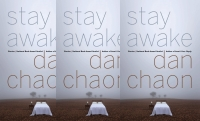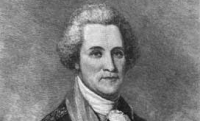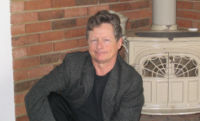Writing Process/”The Knife Act”/Screenwriting/Larger Forces
1. What are you looking forward to in 2010?
Well, mostly importantly, I’m looking forward to selling my book and then going into a bookstore and buying it. Beyond that, I don’t know. I’d like to eat a good steak. And maybe learn how to juggle or something.
2. What can you tell us about Stories For Nighttime and Some For The Day?
It’s the name of my book! I finished it a couple months ago, after three and a half years of writing. It’s a collection of 101 very short stories. Fables, I guess, you could call them. Stylistically they are all pretty similar to “The Knife Act” (which is in it, story #51): bare, focused, surreal stories– although most of them are a little less abstract. I like to describe it as kind of like Warner Brothers cartoons meet The Twilight Zone.
3. Is there a particular story element—such as a specific character, some dialogue, a theme, a scene—that you tend to start with when creating a story?
I have one very strict rule about writing, and that rule is: start with nothing. No scenes, no ideas, no themes or characters– nothing. I sit down with a blank screen and make my brain quiet– and then, first thing that pops into my head, I start writing. Usually it’s an image, but sometimes it’s a line. The rest is just a matter of follow-through.
4. Why do you write, what do you want to accomplish?
Well, there are a couple layers to that. From a creative angle, I write when I’m upset. It’s kind of how I deal with things– or avoid dealing with things, I suppose. Every story is kind of a puzzle I’m suddenly presented with. Or an obstacle course, maybe. I start writing because I have to, because I’m confused, I can’t help it… and then I’m in, and I have to find my way out. Sometimes it takes me forty, fifty drafts to finally find the end of the story. And until I find it, until I get there, I’m trapped inside, and I’m very unhappy. And then when I get there, there’s this tremendous sense of relief and I suddenly understand what I’ve been dealing with and I then I usually burst into tears and feel a thousand times better and then I get to step out of the story and go back to my normal life. It’s kind of like therapy, except it works.
In terms of what I’m trying to do for the reader, with the actual story on the page, it’s basically the same thing but in reverse. I want to throw the reader into conflict and then take them to resolution. Just like any story, basically. I just try to do it as quickly and efficiently as possible, with no metaphors or incidentals to get in the way.
And then, last of all, in, like, the grand sense, what I want to do is write a book that people will keep. Keep around, like out on the coffee table, maybe open at random from time to time. People come over, hey check out this story. Something people want to come back to. Kind of like a Far Side collection, except the pictures are all in your head.
5. You mention you try to do it as “quickly and efficiently as possible,” and, from an editor’s perspective, that’s refreshing because a writers’ biggest challenge is usually getting out of the way of their prose and cutting down the verbiage and telling the story in as few words as is possible. I’d be interested to know where your minimalist sensibility comes from.
When I was in college I tried to read a book by Wittgenstein. I remember one line, it said: “Anything that can be said, can be said clearly.” I didn’t understand anything else in the book, but that line made a big impression.
6. There is a presence (implicit and explicit) of forces beyond your characters control or comprehension in your stories—I’d be interested to know your beliefs concerning higher powers (god(s), fate, karma, et al) as they relate to our world.
Um, yeah… I’d like to know that, too. I was raised an atheist in a god-fearing town, so I was always fascinated with religion. Over time, that interest became a kind of obsession. Then I had this crazy manic episode, and for a while everything became very real. Basically, now, I don’t believe anything, or at least I try not to. I try to keep the whole thing a mystery. My experience is: when you know something for sure, you can be sure it’s not real.
Fair enough.
I will say one thing more. I think the universe is about balance. The natural state is one of rest, but that rest is always kind of in motion. It’s like sitting on a hammock. It’s all well and good but you have to stay aware and make minute adjustments. Drift a little too far and everything gets out of whack. The universe is very good at giving you a push when you start to get out of line. I don’t know if that’s God or what, maybe it’s just the human mind, but whatever it is, it has to be respected. In other words, the Universe is Story.
7. When not reading or writing how do you spend your time, what interests you away from all this?
Music. Writing is what I do because I can’t be a rock star. I’ve tried; it just isn’t gonna happen.
In the meantime I love Bach and Les Paul and Parliament-Funkadelic and The Melvins.
Also I like eating and watching movies. And I like driving around late at night.
I would also like to go bowling, but they tore down the bowling alley.
8. Anything to say about screenwriting?
Being a screenwriter is great for three things: number one, it makes you money. Number two, it makes you learn story structure. And number three, it makes you wanna blow your head off. It is probably the most frustrating thing a human being can become involved in. I did it for a while, then I quit, now I’m starting up again. Which probably means I’ll be writing a lot of stories soon…
9. I’ve been doing this for about a year and half, and before that had little to no idea of the online literature community, and, to this day I still feel like I’ve only scratched the surface, it’s staggering. How do you feel about the thousands of journals, the many indie presses– all serving (ostensibly) the sheer number of voices being heard and read?
Mainly, I feel confused. Every time I open my computer it’s like I’m falling into this giant universe I never even knew existed. I only discovered Duotrope about three months ago. Which was really a big help. It was like learning I had legs and could walk around. Now I’m trying to figure out what “chapbooks” are… I really have no idea what to make of anything. I have met a lot of really nice and talented people, though, who have made me feel really good and hopeful about my writing. And so that’s been really wonderful. Writing is a lonely business, which everyone knows but is true.
10. So, stock question–any writer or text our readers should track down?
Yeah, your readers should go buy the ZZ Top album Tres Hombres and listen to the song “Master of Sparks.” If I wrote a story that awesome I would never stop telling it.
As for writer-writers, I’m pretty heavily into Richard Brautigan these days. His The Hawkline Monster: A Gothic Western has been my favorite book for a couple years now. It’s like Mark Twain having an opium-induced vision of a Scooby-Doo episode. Can’t go wrong.
Ben, thanks for your time.
My pleasure, Patrick. Happy New Year.
Ben Loory’s The Knife Act is featured in Volume 12 of Emprise Review
-
Interviewed by Patrick Mcallaster








Pingback: New Interview: Ben Loory | Emprise Review
Pingback: Contributors « Moon Milk Review
Pingback: On the Way Down: A Story for Ray Bradbury « Moon Milk Review
Pingback: September Prosetry Prompt « Moon Milk Review
Pingback: Contributors « The Doctor T. J. Eckleburg Review